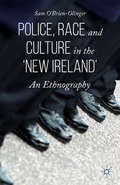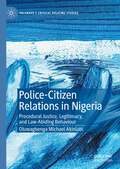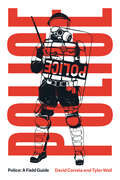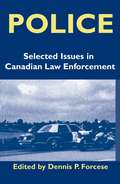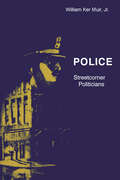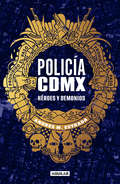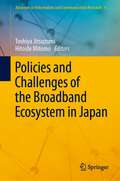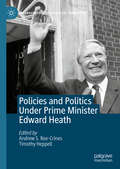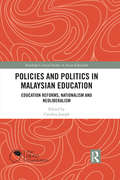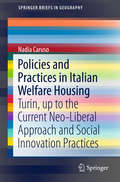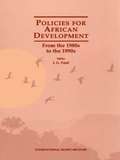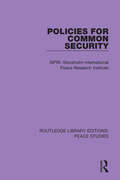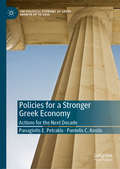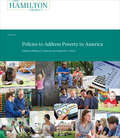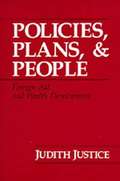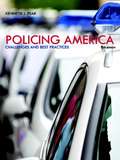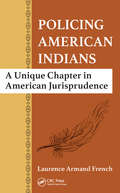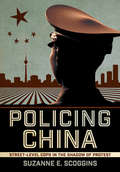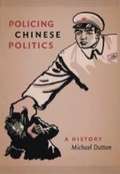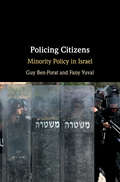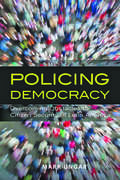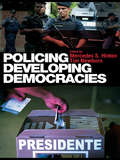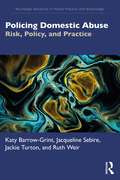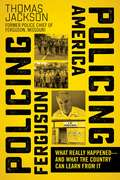- Table View
- List View
Police, Race and Culture in the 'new Ireland': An Ethnography
by Sam O'Brien-OlingerThis book explores the relationship between the Irish police and ethnic minorities, made particularly pressing by the rapid ethnic diversification of Irish society. It addresses the current deficit in knowledge of this area by exploring how Irish police officers conceive of, talk about, and interact with Ireland's immigrant minority communities.
Police-Citizen Relations in Nigeria: Procedural Justice, Legitimacy, and Law-Abiding Behaviour (Palgrave's Critical Policing Studies)
by Oluwagbenga Michael AkinlabiThis book offers an historical and contemporary analysis of policing and police-citizen relations in Nigeria, to understand why people co-operate (or don’t) with the police. It examines police legitimacy and the validity of procedural justice theory in a post-colonial African context where corruption, brutality and lack of accountability are not uncommon, to find more refined and alternative answers to the question of why people co-operate (or don’t) with the police. The history of policing in Nigeria is explored first and then procedural justice theory is tested through an extensive, cross-sectional survey of the public. One of the core findings is that citizens’ co-operation with the police is driven less by legitimacy but more by effectiveness considerations and “dull compulsion”, a concept akin to legal cynicism. This study represents one of the first attempts to test and understand “dull compulsion” and its relevance in this context. Overall, it develops the field by illustrating that that there are significant variations between contexts when addressing the influence of perceived procedural justice policing on perceptions of police legitimacy, and it explains the implications for policy makers.
Police: A Field Guide
by David Correia Tyler WallIt doesn’t take firsthand experience to learn the meaning of pain compliance or rough ride. Police: A Field Guide is an illustrated handbook to the methods, mythologies, and history that animate today’s police. It is a survival manual for encounters with cops and police logic, whether it arrives in the shape of officer friendly, Tasers, curfews, non-compliance, or reformist discourses about so-called bad apples. In a series of short chapters, each focusing on a single term, such as the beat, order, badge, throw-down weapon, and much more, authors David Correia and Tyler Wall present a guide that reinvents and demystifies the language of policing in order to better prepare activists—and anyone with an open mind—on one of the key issues of our time: police brutality. In doing so, they begin to chart a future free of this violence—and of police.
Police: Current Issues in Canadian Law Enforcement
by Dennis P. ForceseNot a day goes by in which the police do not figure prominently in the news. Whether it be as investigators of a rural homicide, or as the subjects of a debate on police chases, the police are ever-present. They are news. The public’s fear of crime and the "law and order" agenda prominently advanced by many politicians make Police a particularly topical collection of original essays that examine developments and issues of public concern relating to Canada’s municipal police. These essays address such issues of public debate as police regionalization, the role and militancy of police unions, the proliferating use of police tactical units, facts and fictions of community policing, stress symptoms such as divorce among serving police officers, and the role and career prospects of women in policing.
Police: Streetcorner Politicians
by William K. Muir Jr."This book . . . examines the problem of police corruption . . . in such a way that the stereotype of the crude, greedy cop who is basically a grown-up delinquent, if not an out-and-out robber, yields to portraits of particular men, often of earnest good will and even more than ordinary compassion, contending with an enormously demanding and challenging job."—Robert Coles, New Yorker "Other social scientists have observed policemen on patrol, or have interviewed them systematically. Professor Muir has brought the two together, and, because of the philosophical depth he brings to his commentaries, he has lifted the sociology of the police on to a new level. He has both observed the men and talked with them at length about their personal lives, their conceptions of society and of the place of criminals within it. His ambition is to define the good policeman and to explain his development, but his achievement is to illuminate the philosophical and occupational maturation of patrol officers in 'Laconia' (a pseudonym) . . . . His discussions of [the policemen's] moral development are threaded through with analytically suggestive formulations that bespeak a wisdom very rarely encountered in reports of sociological research."—Michael Banton, Times Literary Supplement
Policia CDMX: Héroes y demonios
by Andrés M. EstradaHablar de la policía de la Ciudad de México es hablar de una institución de claroscuros. Escándalos, violaciones, sobornos y corruptelas se tejen al interior de esta policía junto con elementos realmente valiosos para la sociedad capitalina. Este libro da voz, mediante una profunda investigación, a quienes han vivido estas contradicciones para bien y para mal. La ferozcorrupción interna; el cobijo de ciertos mandos hacia grupos delincuenciales; el acoso sexual que sufren las mujeres policías; la fabricación de delitos y su negocio redondo; la precariedad de los sueldos, y un largo etcétera. Pero a la par, y más allá del estigma que recae sobre el policía de a pie, hay verdaderos héroes que arriesgan la vida en las calles y no obtienen más que el anonimato y unas cuantas balas zumbando sobre sus cabezas. Las historias aquí vertidas atestiguan que verdaderos héroes y demonios conviven en dicha institución.
Policies and Challenges of the Broadband Ecosystem in Japan (Advances in Information and Communication Research #4)
by Hitoshi Mitomo Toshiya JitsuzumiThis book shows how telecom, broadcast, and Internet researchers as well as experts from Japan's leading mobile operators interpret, analyze, and evaluate the emerging phenomenon of the Japanese broadband ecosystem. The broadband ecosystem, as it rapidly changes against the backdrop of swift technological progress, is forcing major changes in the existing socioeconomic framework and generating many policy issues that require discussion.The book aims to provide a theoretical and practical framework for policymakers to address these issues from a broader perspective than has been available in the past. The topics addressed in this book cover sharing of 5G infrastructure, online platform regulation, diffusion of autonomous driving, content industry, trends and use cases of 5G, capacity development for AI, ride-hailing service, smartphone games, the right to be forgotten, and the economic value of personal information.Although this book cannot provide definitive answers to all these recently emerging and rapidly changing issues, it does provide important guidance for evidence-based discussion involving policymakers and researchers working on these issues. It is also recommended for graduate students who want to enter this challenging field of policy discussion.
Policies and Politics Under Prime Minister Edward Heath (Palgrave Studies in Political Leadership)
by Timothy Heppell Andrew S. Roe-CrinesThis book explores the political and intellectual significance of Edward Heath’s leadership of the Conservative Party. It contains a series of original and distinctive chapters that feature extensive archival materials and original insights from leading political scientists and historians. The volume contributes significantly to our understanding of Conservative Party politics, leadership, and conservatism more broadly.
Policies and Politics in Malaysian Education: Education Reforms, Nationalism and Neoliberalism (Routledge Critical Studies in Asian Education)
by Cynthia JosephThis book draws on elements of critical social theory, research on globalization, neo liberalism and education, and Malaysian Studies to understand the interplay of globalization, nationalism, cultural politics and ethnicized neoliberalism in shaping the educational reforms in Malaysia. Using the Malaysia Education Blueprint 2013-2025 (MEB) as a case study, a catalyst and a context, this collection critically explores some of the complex historical and contemporary push-pull politics and factors shaping Malaysia’s education system, its reform and the experience of Malaysians – and others – within it. The authors in this volume focus on the interplay of neoliberalism, nationalism, ethnic and cultural politics in shaping the educational reforms in Malaysia. Their work captures and seeks to understand the enduring, though changing, hierarchy of access and differentiated rights to educational, social and economic resources and opportunities experienced by different individuals and collectives, including those involved in the neoliberal enterprise of international education. It looks at how inequities have been re-configured in different educational spaces in Malaysia, and at how these inequities have been addressed through reform policies and practices. The book will be a shaper and critical contributor to the assessment of the Malaysian Education Blueprint and related policies. It will also have wider relevance globally as a critical approach to policy discussion.
Policies and Practices in Italian Welfare Housing
by Nadia CarusoThis book offers a European perspective on urban planning and spatial design by outlining housing policies in Southern Europe and their evolution. Through a unique case study on the city of Turin it explores social innovation and the relationship between the urban regeneration process and housing practices. The case study is a useful example in the debate about changing welfare arrangements in Europe and the emerging rhetoric of social innovation in housing. The book encourages debate about the tools needed to address housing needs, exploring current practices. Chapters look at the spatial dimension of housing, the financial mechanisms put in place, the actors involved in the field (public authorities, ethical investors, tertiary sector, inhabitants and locals. ) The case study of the metropolitan city of Turin demonstrates complex housing needs and the innovative character of public and private solutions. As this book combines theory and practice, it appeals to both academics and practitioners. It is especially be of interest to spatial planners, geographers and social scientists interested in housing policies, and those interested in the Italian context of the case study.
Policies for Common Security (Routledge Library Editions: Peace Studies)
by Stockholm International Peace Research Institute (SIPRI)The basic idea of common security is not complex. It is that no country can obtain security, in the long run, simply by taking unilateral decisions about its own military forces. This is because security depends also on the actions and reactions of potential adversaries. Security has to be found in common with those adversaries. These ideas were considered in a SIPRI conference held in 1983. The conference had two main objectives. The first was to undertake a critical examination of the concept. The second was to consider the implications of the idea for policy in general, and for disarmament and arms control policy in particular. Originally published in 1985, this book contains revised versions of some of the papers presented at the conference.
Policies for a Stronger Greek Economy: Actions for the Next Decade (The Political Economy of Greek Growth up to 2030)
by Panagiotis E. Petrakis Pantelis C. KostisThis book presents a comprehensive economic plan for Greece to encourage growth and avoid future crises. This book emphasizes structural reforms and the rational financial management and analysis of private and investment infrastructures. This book also looks at the country's production and places an emphasis on revitalizing its technological structure. The analysis in this book includes policy implementation (in the short-, medium- and long-term) across important topics such as sustainability, inclusivity, pro-growth social behavior, and dynamic economic growth. This book takes an evolutionary economics perspective, looking at important structures throughout society like governance, political functioning, cultural attitudes, and growth. With its comprehensive approach, this book is crucial reading for scholars and policymakers interested in the Greek economy.
Policies to Address Poverty in America
by Melissa S. Kearney Benjamin H. HarrisOne-in-seven adults and one-in-five children in the United States live in poverty. Individuals and families living in poverty not only lack basic, material necessities, but they are also disproportionally afflicted by many social and economic challenges. Some of these challenges include the increased possibility of an unstable home situation, inadequate education opportunities at all levels, and a high chance of crime and victimization. Given this growing social, economic, and political concern, The Hamilton Project at Brookings asked academic experts to develop policy proposals confronting the various challenges of America's poorest citizens, and to introduce innovative approaches to addressing poverty. When combined, the scope and impact of these proposals has the potential to vastly improve the lives of the poor. The resulting 14 policy memos are included in The Hamilton Project's Policies to Address Poverty in America. The main areas of focus include promoting early childhood development, supporting disadvantaged youth, building worker skills, and improving safety net and work support.
Policies, Plans, and People: Foreign Aid and Health Development
by Judith JusticeJudith Justice uses an interdisciplinary approach to show how anthropologists and planners can combine their expertise to make health care programs culturally compatible with the populations they serve.
Policing America: Challenges and Best Practices (Eighth Edition)
by Kenneth J. PeakPolicing America: Challenges and Best Practices, 8e, offers a problem-solving approach that emphasizes what is actually working in the field. Based on the author’s thirty-plus years of practical policing and academic experience, this eighth edition continues to be set apart by its traditional, applied, “what works” theme. That, coupled with comprehensive updates throughout and the minor restructuring of this edition, provide an approach not otherwise found on the market. Emphases are on topics of major, national importance and interest, such as terrorism, personnel issues, community policing, investigations, rule of law, accountability (ethics, liability), patrol, and technologies. Organized to flow smoothly for the instructor and student, this edition continues to provide a penetrating view of one of the most difficult and challenging occupations in America: policing!
Policing American Indians: A Unique Chapter in American Jurisprudence
by Laurence Armand FrenchBias, prejudice, and corruption riddle the history of US jurisprudence. Policing American Indians: A Unique Chapter in American Jurisprudence explores these injustices, specifically the treatment of American Indians. A mix of academic research as well as field experience, this book draws on author Laurence French‘s more than 40 years of experience
Policing China: Street-Level Cops in the Shadow of Protest (Studies of the Weatherhead East Asian Institute, Columbia University)
by Suzanne E. ScogginsIn Policing China, Suzanne E. Scoggins delves into the paradox of China's self-projection of a strong security state while having a weak police bureaucracy. Assessing the problems of resources, enforcement, and oversight that beset the police, outside of cracking down on political protests, Scoggins finds that the central government and the Ministry of Public Security have prioritized "stability maintenance" (weiwen) to the detriment of nearly every aspect of policing. The result, she argues, is a hollowed out and ineffective police force that struggles to deal with everyday crime.Using interviews with police officers up and down the hierarchy, as well as station data, news reports, and social media postings, Scoggins probes the challenges faced by ground-level officers and their superiors at the Ministry of Public Security as they attempt to do their jobs in the face of funding limitations, reform challenges, and structural issues. Policing China concludes that despite the social control exerted by China's powerful bureaucracies, security failures at the street level have undermined Chinese citizens' trust in the legitimacy of the police and the capabilities of the state.
Policing Chinese Politics: A History
by Michael DuttonBeginning with the bloody communist purges of the Jiangxi era of the late 1920s and early 1930s and moving forward to the wild excesses of the Cultural Revolution, Policing Chinese Politics explores the question of revolutionary violence and the political passion that propels it. "Who are our enemies, who are our friends, that is a question germane to the revolution," wrote Mao Zedong in 1926. Michael Dutton shows just how powerful this one line was to become. It would establish the binary division of life in revolutionary China and lead to both passionate commitment and revolutionary excess. The political history of revolutionary China, he argues, is largely framed by the attempts of Mao and the Party to harness these passions.The economic reform period that followed Mao Zedong's rule contained a hint as to how the magic spell of political faith and commitment could be broken, but the cost of such disenchantment was considerable. This detailed, empirical tale of Chinese socialist policing is, therefore, more than simply a police story. It is a parable that offers a cogent analysis of Chinese politics generally while radically redrafting our understanding of what politics is all about. Breaking away from the traditional elite modes of political analysis that focus on personalities, factions, and betrayals, and from "rational" accounts of politics and government, Dutton provides a highly original understanding of the far-reaching consequences of acts of faith and commitment in the realm of politics.
Policing Cinema: Movies and Censorship in Early Twentieth-Century America
by Lee GrievesonTracing the discourses and practices of cultural and political elites and the responses of the nascent film industry, Grieveson reveals how these interactions had profound effects on the shaping of film content, form, and, more fundamentally, the proposed social function of cinema: how cinema should function in society, the uses to which it might be put, and thus what it could or would be.
Policing Citizens: Minority Policy in Israel
by Guy Ben-Porat Fany YuvalWhat does police violence against minorities, or violent clashes between minorities and the police tell us about citizenship and its internal hierarchies? Indicative of deep-seated tensions and negative perceptions; incidents such as these suggest how minorities are vulnerable, suffer from or are subject to police abuse and neglect in Israel. Marked by skin colour, negatively stigmatized or rendered security threats, their encounters with police provide a daily reminder of their defunct citizenship. Taking as case studies the experiences and perceptions of four minority groups within Israel including Palestinian/Arab citizens, ultra-Orthodox Jews and Ethiopian and Russian immigrants, Ben-Porat and Yuval are able to explore different paths of citizenship and the stratification of the citizenship regime through relations with and perceptions of the police in Israel. Touching on issues such as racial profiling, police brutality and neighbourhood neglect, their study questions the notions of citizenship and belonging, shedding light on minority relationships with the state and its institutions.
Policing Democracy: Overcoming Obstacles to Citizen Security in Latin America
by Mark Ungar2011 Winner of the Charles H. Levine Memorial Book Prize of the International Political Science AssociationLatin America’s crime rates are astonishing by any standard—the region’s homicide rate is the world’s highest. This crisis continually traps governments between the need for comprehensive reform and the public demand for immediate action, usually meaning iron-fisted police tactics harking back to the repressive pre-1980s dictatorships. In Policing Democracy, Mark Ungar situates Latin America at a crossroads between its longstanding form of reactive policing and a problem-oriented approach based on prevention and citizen participation. Drawing on extensive case studies from Argentina, Bolivia, and Honduras, he reviews the full spectrum of areas needing reform: criminal law, policing, investigation, trial practices, and incarceration. Finally, Policing Democracy probes democratic politics, power relations, and regional disparities of security and reform to establish a framework for understanding the crisis and moving beyond it.
Policing Developing Democracies
by Tim Newburn Mercedes S. HintonThere are enormous challenges in establishing policing systems in young democracies. Such societies typically have a host of unresolved pressing social, economic and political questions that impinge on policing and the prospects for reform. There are a series of hugely important questions arising in this context, to do with the emergence of the new security agenda, the problems of transnational crime and international terrorism, the rule of law and the role of the police, security services and the military. This is a field that is not only of growing academic interest but is now the focus of a very significant police reform ‘industry’. Development agencies and entrepreneurs are involved around the globe in attempts to establish democratic police reforms in countries with little or no history of such activity. Consequently, there is a growing literature in this field, but as yet no single volume that brings together the central developments. This book gathers together scholars from political science, international relations and criminology to focus on the issues raised by policing within developing democracies examining countries in Eastern Europe, Asia, South America and Africa.
Policing Domestic Abuse: Risk, Policy, and Practice
by Jackie Turton Katy Barrow-Grint Jacqueline Sebire Ruth WeirThis book is dedicated to improving the practice of the policing of domestic abuse. Its objective is to help inform those working in policing about the dynamics of how domestic abuse occurs, how best to respond to and investigate it, and in the longer term how to prevent it. Divided into thematic areas, the book uses recent research findings to update some of the theoretical analysis and to highlight areas of good practice: &‘what works and why&’. An effective investigation and the prosecution of offenders are considered, as well as an evaluation of the success of current treatment options. Policing domestic abuse can only be dealt with through an effective partnership response. The responsibilities of each agency and the statutory processes in place when policy is not adhered to are outlined. Core content includes: A critique of definitions and theoretical approaches to domestic abuse, including coverage of the myths surrounding domestic abuse and their impact on policing. An exploration on the challenges of collecting data on domestic abuse, looking at police data and the role of health and victim support services. A critical review of different forms of abuse, different perpetrators and victims, and risk assessment tools used by the police. A critical examination of the law relating to domestic abuse; how police resources are deployed to respond to and manage it; and best practice in investigation, gathering evidence, and prosecution Key perspectives on preventing domestic abuse, protecting victims, and reducing harm. Written with the student and budding practitioner in mind, this book is filled with case studies, current research, reports, and media examples, as well as a variety of reflective questions and a glossary of key terms, to help shed light on the challenges of policing domestic violence and the links between academic research and best practice.
Policing Ferguson, Policing America: What Really Happened—and What the Country Can Learn from It
by Thomas JacksonFollowing the fatal shooting in broad daylight of unarmed African American Michael Brown by a white cop in August 2014, Ferguson, Missouri became the scene of protests that pitted law enforcement against locals and Black Lives matter activists. The media firestorm has not waned, and, in fact, has grown stronger in light of all the recent violence by and against police officers nationwide. According to Ferguson’s former police chief Tom Jackson, the uninformed media actually fans the flames of unrest and exploits the situation: infotainment optics have become more important than truth, while social media spreads the news without providing context. Policing Ferguson, Policing America is the book that finally tells the inside story of what happened in Ferguson, and how good guys became the bad guys through media and political distortion. Pressure is at a boiling point. In 2016, America has been rocked by heart-wrenching fatal shootings of African Americans by police officers in Louisiana and in Minnesota, and by the shootings of police offers in Dallas, Baton Rouge, and Kansas City that left eleven officers dead and a dozen more wounded. To many Americans, the central theme of this continuing bloody story is one of racial injustice and out-of-control policing. Policing Ferguson, Policing America brings common sense and a keen insider’s understanding to a complex story. Black Lives Matter, and so do the lives of cops. Citizens and law-enforcement professionals alike feel the urgent need for our systems and procedures to change for the better. Few people are in a better position to explore the issues than Chief Jackson. In Policing Ferguson, Policing America, Jackson tells for the first time the real Ferguson story while sharing his thoughts about the steps we can take together to improve all Americans’ lives, and restore the vital trust between the police and the communities they serve. His well-informed recommendations just may improve this dire situation.
